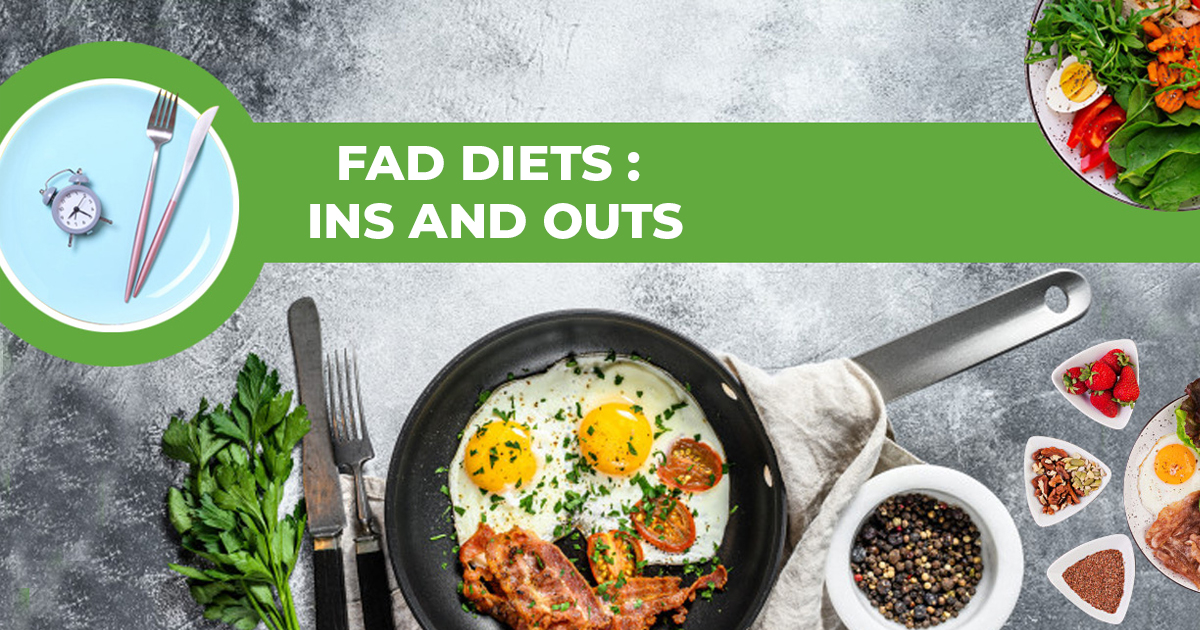
Let’s imagine it’s January, you ate a lot over the holidays and now you are looking for a way to drop the extra pounds, or perhaps you’ve been wanting to fit into those old jeans for a while now. What are you going to do?
Option 1: You can make small changes. However, you will have to wait some time to notice those results. ‘OR’
Option 2: You could make drastic changes to your diet and/or lifestyle that last for a few days or weeks and then go back to normal.
Most of us would choose ‘Option 2’, because we all want quick fixes and fast results. This is essentially what precedes a fad diet (a diet that is imbalanced in some way which usually leads to rapid weight loss) i.e. a crash diet.
Unfortunately, ‘Option 2’ generally steers us to gain the weight back, once we go back to our normal diet. So why is it that so many of us fall into the trap of fad diets?
In this article we’ll answer some common questions around fad diets.
Do we need to diet?
The word ‘diet’, although synonymous with curtailing what you eat to achieve weight loss, actually just refers to ‘what one eats’. So thinking of the word diet as a
practice to achieve weight loss is definitely a myth. If we change the question to ‘do we need to curtail what we eat to achieve weight loss?’, the answer would be a possible yes. It all depends on your body’s energy balance. If you cause a deficit in the energy balance overall, you will lose weight.
(Note: Please refer to the energy balance article for more details). This is the same reason why some fad diets work, which is the basis for the next question.
Do fad diets work?
Well, if they cause an energy deficit then yes, they do. However, generally these diets are imbalanced in some way. Some can be, for example, very high in protein/fat,
others are diets deficient in some micronutrients like vitamin C and some diets recommend some form of starvation. Following these diets can have long -term negative consequences. Furthermore, the weight loss these diets give, tend to be very temporary, thus, they do not usually lead to long term weight loss. Additionally, drastic weight loss in a short span of time can also have negative health consequences.

Does a detox diet work?
No, not really. Your kidneys and liver are the best detoxing tools you need. You can help improve and sustain their functioning by having plenty of fluids, reducing your alcohol consumption and eating a plethora of fruits and vegetables. Again, a detox diet can be dangerous as you may over/under consume some foods. For example, when making a smoothie you may end up using double or triple the amount of fruit or vegetable you would normally eat.This may lead to some micronutrients reaching their toxicity levels.
How can you identify a fad diet?
As previously mentioned, fad diets are imbalanced in some way. Therefore, compare the diet to the government recommended Eatwell Guide which recommends 5 fruits or vegetables per day, a macronutrient breakdown of: carbohydrates 50%, fat 35% and protein 15%, etc. The Health Click Away app can support you in checking the macronutrient percentages. This can help you identify if a diet is imbalanced or not.

What is a sensible way to lose weight?
Ultimately, it is about making small, sustainable changes which lead to long term weight loss/maintenance. Aiming for a deficit of 500kcal/day is appropriate for modest weight loss of 1-2 lbs (0.5-1kg) per week. This could be achieved by increasing your physical activity levels and reducing your calorie intake. Check out this article on efficient changes you can make to lose weight/ be healthier. You can use the app “Health Click Away” You can use the app “Health Click Away” to track your calorie intake and also understand how many calories you burn when you engage in activities like walking, to see if you are meeting your goals. Forget Fad diets and stick to a healthy balanced diet for long term results. #NoCrashDiet #NoStarvation



